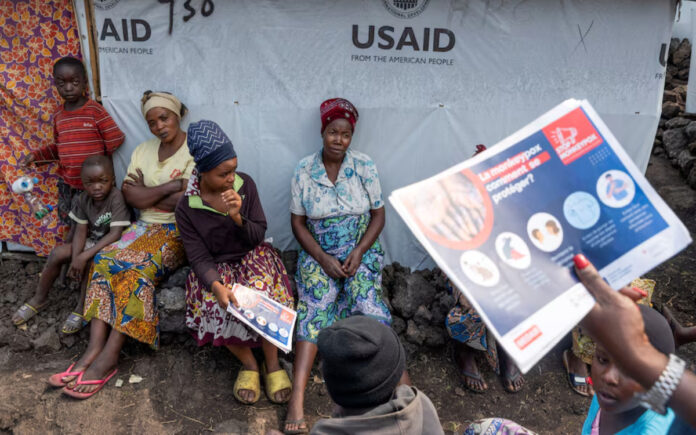Kanyarutshinya Camp, DRC: Justine Munguiko struggled to recall the name of the disease affecting her baby, Fidele. All she knew was that her child had developed painful sores similar to those seen among other children at the displacement camp near Goma in eastern Congo.
The Democratic Republic of Congo (DRC) is at the heart of an mpox outbreak that the World Health Organization recently declared a global public health emergency. Communities like Munguiko’s are among the most exposed and urgently require support.
Munguiko and other mothers at the camp chose to treat their children with traditional remedies for fevers and rashes. They washed their children in boiled salty water and applied the soft leaves of the Kitamatama plant. “This disease of skin lesions comes from I don’t know where… We’ve been told it comes after eating bushmeat, but neither I nor my child have eaten bushmeat,” said the 24-year-old mother, while trying to comfort her baby who had crusty sores on his wrists and feet.
As the international community grapples with sourcing enough vaccines, Munguiko’s situation underscores the significant efforts needed to ensure that the most vulnerable populations receive accurate information and adequate resources to protect themselves from mpox—a virus that, while often mild, can be fatal.
Effective communication is crucial, according to Ebere Okereke, an associate fellow at Chatham House’s Global Health Programme. “We need to get the right information out to the people who are immediately at risk,” she told Reuters.
Since the outbreak began in January 2023, Congo has reported approximately 27,000 cases and over 1,100 deaths, predominantly among children. The virus has also spread to neighboring countries.
Also Read | NATO Allies Falter on Air-Defense Promises to Ukraine, Raising Alarm
At Kanyarutshinya camp, residents gathered in an open area to hear a health worker from the aid organization Medair explain preventive measures. They received a colorful leaflet with illustrations showing the risks of close contact with infected animals or people.
The challenge in Congo and other African countries is exacerbated by a lack of funding for research, according to Helen Rees, co-chair of South Africa’s mpox incident management team. “We still globally do not have a good understanding of mpox … outbreaks, how it spreads, how many asymptomatic cases we have for every case that we find with symptoms,” she told Reuters.
Local residents are eager for more information as well. Camp resident Bizimungu Habimana, 46, examined the leaflet closely after the Medair presentation. “We thought there was no medicine or cure for this disease. I’m so glad to hear it’s curable,” he said.



